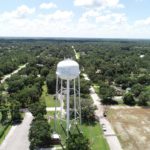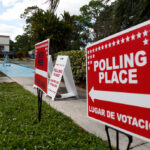FELLSMERE — A $10,000 video and a two-part ballot question are a part of what Fellsmere leaders hope will bring economic growth to the city.
Sitting around a table at Marsh Landing Monday, community and city leaders discussed what should be in the video and how the referendum question could impact the city. “I’m concerned,” Sebastian River Area Chamber of Commerce Executive Director Beth Mitchell told those gathered. She explained that while $5,000 of funding has been earmarked for the promotional video through the county’s Tourism Development Council, it is not a done deal.
Commissioners are expected to finalize their budget in September and have until that time to make changes.
“We can’t do the project without the full amount,” Mitchell said. The City of Fellsmere has committed to funding half the video’s expense.
Though the funding is not nailed down, Mitchell asked the attendees for their suggestions for what should be included in the video.
Natural and historical resources, along with large parcels of undeveloped land were among the first ideas kicked about.
“The biggest thing Fellsmere has is available land,” Sebastian City Councilman Don Wright said.
Fellsmere City Manager Jason Nunemaker said the trick would be showing those large tracts of land.
“I was thinking of a fly-over,” Mitchell said of taking aerial video of the properties, adding that photographs are “just not the same thing.”
Other suggestions included incorporating the green industries Fellsmere has started to attract, such as PetroAlgae and Green Flight International.
Fellsmere plans to ask its residents during the November municipal election to approve a two-pronged referendum that city leaders hope will also spark new growth and more jobs.
The ballot referendum has tied offering tax breaks to those whose properties are designated as brownfields.
Brownfield areas are designated zones that contain properties that have actual or perceived pollution. The designation allows property owners to request financial assistance in cleaning up the pollution and promote its redevelopment.
By tying the brownfield zones to an offer of tax abatement, the city – not the state – can set the qualifications and rules for the abatements.
Last year, the City of Sebastian’s voters supported allowing its council to offer tax abatements to businesses that either moved in or expanded and increased the number of employees hired.
Qualifying businesses would be allowed to freeze their property tax by a certain percentage for a period of time depending on how many jobs and how high the wage they would be creating.
According to Fellsmere’s current plans, the maximum abatement that could be offered – for a business bringing in nine or more $50,000-plus salary jobs in a “value-added” industry – would be 100 percent property tax freeze for 10 years.
That means the property tax the business is paying now would be same tax bill it would receive for the next 10 years, regardless of the improvements and expansion done on the site. After that, the business would pay the “real” property tax assessed on the site.
Fellsmere leaders are expected to meet again in October to continue their discussions on the city’s economic future.






